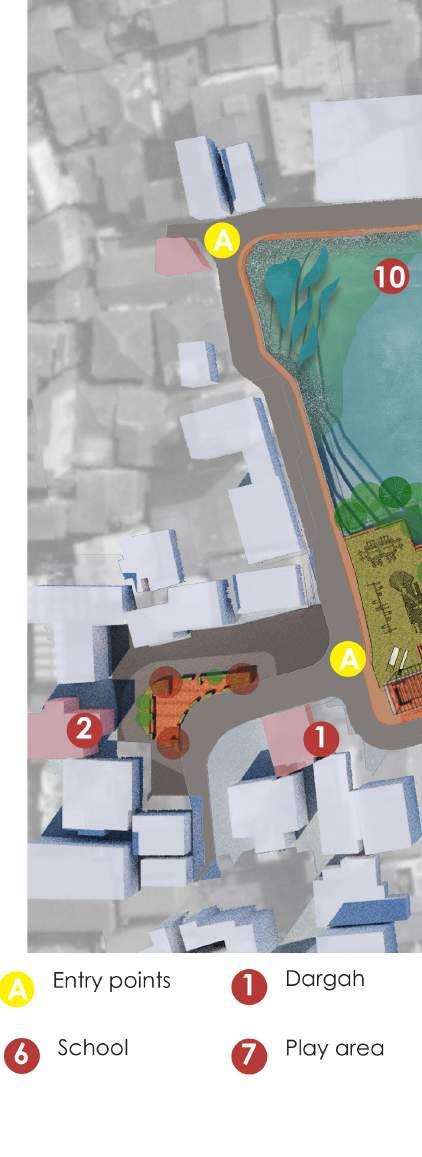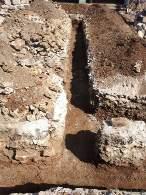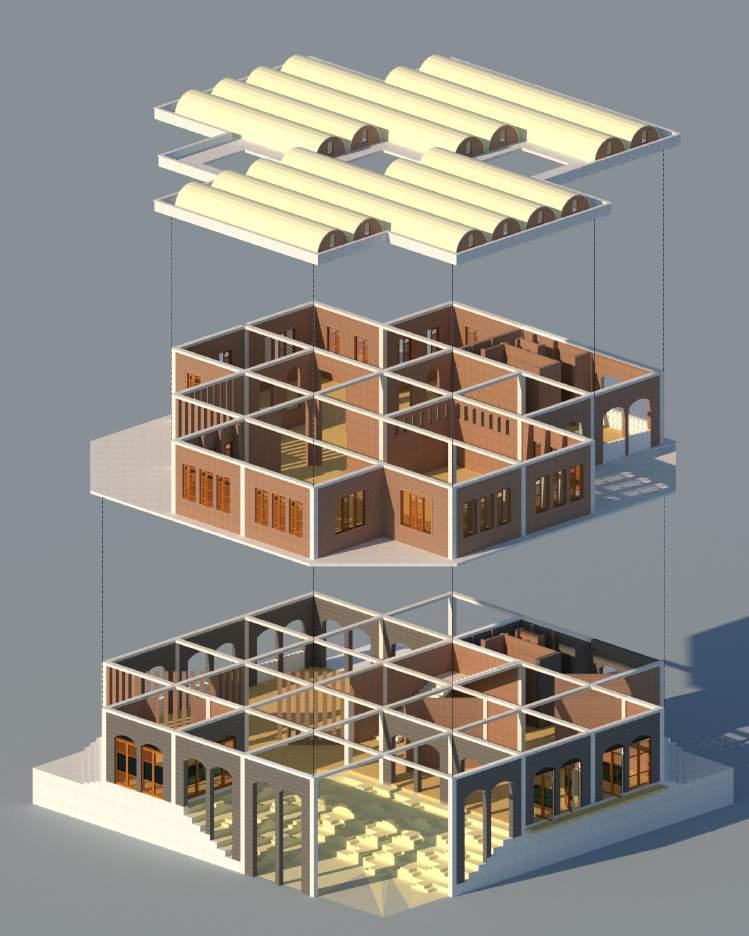

PROFESSIONAL WORKS
01.GITA NAGARI - AJHAI Campus masterplan development
Sejpal and Parekh Associates | 2022
Working towards developing Gita Nagari university in Ajhai Khurd, Mathura, the brief lays its focus on preserving and celebrating various facets of Indian cultural and spiritual heritage through education and promoting a vedic and sustainable lifestyle. The campus works in giving the students various opportunities to learn and live a life of festivity, celebrate rich culture, spiritual awareness and live in harmony with nature.
The aim is to create a global campus, which becomes a melting pot for devotees of various communities and countries looking for knowledge and spiritual devotion, while providing world class facilities and amenities to suit various requirements.
The intent is thus to develop a sensitive design that bears in mind the local ecology, terrain and biodiversity, while maintaining a strong connection to the idea of Braj and Shri Krishna’s stories.
PROCESS
EXISTING SITE WATER AND GHAT EDGE FORESTED GREENS & DEVELOPMENT OF CLUSTERS

COURTYARD AS COMMONS WITH BUILDINGS NESTLED AMIDST

C1 Vocational Science and technology cluster
consists of - School of vocational science +student hostel+Baelvana
C2 School of Science cluster
consists of - School of science+ student hostel+Talavana
C3 School of Science cluster
consists of - School of Integrated Business Admin+Student Hostel+ Khadiravana
C4 Graduate and Faculty residential cluster
consists of graduate and faculty residential buildings+Madhuvana+ existing faculty house

C5 Existing school cluster
consists of - existing school+proposed student hostel+school of Geeta Vidyapeetham + Bhadravana
C6 Amenity cluster





consists of - All the ameniies including dining Kitchen, Sports, Library,Museum & Arts + Bhandiravana and Nidhivana

C7 Graduate of Sanskrit Cluster consists of - School of + student hostel + Lohavana
C8 School of Indian cluster consists of - School student housing + Kumudvana
C9 Faculty and Housing cluster consists of - Faculty dential buildings +Kamyavana
Hindu and Cluster of Hindu and Sanskrit Lohavana
Indian Heritage
of Indian heritage + Kumudvana


Doctoral cluster and doctoral resiKamyavana
Mahavana
consists of - fields, forest, orchards, water meadows, kunds and swales





Incubation + Milk plant
Gaushala area and Bahulavana
consists of - cow sheds, fodder fields and paddocks
Baelvana - The courtyard is an orchard with outdoor classes and gathering spaces
Khadiravana - The courtyard houses think tanks, performance spaces and shaded arbors withing the business school





Bhandiravana - A central plaza with banyan tree acts as a gathering space.

Vrindavana - The avenue leading upto the temple with fruiting tree orchards
Lohavana- The cultural hub which can also double up as an event/mela space. An outdoor exhibit space.
Kumudvana - It is a kund filled with lotuses and chattris for meditation abut ting it, a promenade, and a water meadow lapping the edge of the academic building.
BAELVANA - Internal courtyard view of vocational science and technology cluster with residential building with

02. TALOJA WETLAND PARK Landscape design

The project imagines an existing lake as a wetland, while restoring its ecology. The process involved understanding of global agendas undertaken by countries for climate change. The project tries to create spaces that interact with the waters edge and preserve it.

Road network




Immersion pond view


Playing area

 Viewing deck
Viewing deck
03. SHAOLYN HOUSE
Architecture restoration, Lonavala
Sejpal and Parekh Associates | 2022-2023
A 70 year old colonial style bungalow with 4500sqft of built up area and 1 acre site area in Lonavala, Maharashtra. The project started with formal retrofitting works of the roof structure. Built entirely in wood, the roof structure was carefully repaired and restored to its original shape. The client intended on restoring the interiors keeping the aspects of vastu planning in mind. The major challenge were the 21” thick random stone/rubble masonry walls. The intervention was to weave around the existing structure, without any kind of punctures to the load bearing stone walls. Most beautiful flooring in china chip mosaic with intricate detailing was restored, the process involved heavy documentation of these patterns so that all the additional inserts coalesce as a unit seamlessly.

Structural restoration of east porch roof





North-east porch views
BEFORE AFTER






04.RURAL HABITAT DEVELOPMENT PROGRAM
Internship | Aga Khan Agency for Habitat

The site is excavated and single reinforcement bars are placed at every junction. A layer of PCC bed and foundation masonry is then added upto ground level.


The plinth height is achieved by stone masonry and plinth beam running throughout the profile.
A second layer of reinforcement band runs at lintel level. This holds the corner of openings and prevents development of cracks diagonally from the openings.

The stone at junction is either pierced at center or corner for the reinforcement bar to pass through it. The stones are overlapped resulting in locking of corners.

The project was a part of the earthquake resistant housing scheme at Chitravad village in Southern Saurastha where a beneficiary is assisted in design and construction as per the zone 3 measures. The organisation worked for several years in the region to develop habitat and community development.


ACADEMIC WORKS
04. REVISITING RURAL NARRATIVES
Design Dissertation Semester 9&10 | 2020

Site area : 11 acres
The five year long drought has brought several problems in the state of Maharashtra. Drought is in its worst phase in regions of Marathwada and Vidarbha. Despite of unpredicted heavy rainfall in last two years, this part of state is still longing for water. With increasing urbanization and deteriorating quality of life in urban areas, migration has become a forced choice. The project tries to improve quality of life in drought affected regions of Maharashtra by employment generation and sustainable livelihood thereby emphasizing on the need of ‘rural design’. With the growing trend of ‘model village’, the project provides an architectural intervention for a holistic development of one such model village on the banks of Godavari river in Beed district of Maharashtra.
The site currently acts as a route for villagers to visit the river bank for daily chores. It is a part of their daily movement pattern.
Designing of solid blocks on ground will obstruct the daily commute pattern of villagers.
Instead reversing the typology, keeping ground open for public movement and interaction.
The journey of every user happens through these semi-open, informal built spaces.
Pohner village along the banks of Godavari river is one of the many neighboring settlements affected by drought and the resulting migration. The village, with its resources used optimally and provision of pubic infrastructure providing opportunities of income generation through vocational training has scope of developing self-sufficiently.




 Tale of seasonal migrants
Pohner village
Godavari river
Tale of seasonal migrants
Pohner village
Godavari river
8M WIDE ROAD (Vehicular movement)


EXPLODED AXONOMETRIC

The educational block is designed such that the central path becomes a major axis of circulation on site. The journey of users to market and workshop happens through the central axis, allowing people to peep in and participate in the activities happening on ground floor.

 Window elevation detail
Window elevation detail
Design Dissertation| Re-visiting Rural Narratives

Working
for panchayat members

PANDE| SEAT NO.: 6062WALL SECTION (accommodation
Mangalore tiles
20 x 35mm Battens
80mm thk Rafters
65 x 65mm Purlin
150mm thk RCC band Timber bracket
Cross-fixed wooden gutter holder
Parapet wall jail detail at ‘B’


150mm thk RCC lintel band
Openable window shutter
Fixed vertical louvers
hidden inside the appearance.
THIRD LAYER
300mm thk basalt course masonry wall
250
China mosaic tiles
Guna (conical) tiles barrel vault
Toughened glass window
A115mm thk brick wall at vault opening
600 x 450mm RCC gutter
300 x 300mm RCC beam
230mm thk brick cavity wall

150mm thk RCC lintel
450mm wide RCC chajja
100mm thk white band around windows for elevational purpose
50mm thk timber frame
Openable window shutter
230mm thk brick pier acting as buttress
50mm thk granite platform
600mm wide overhang for elevational purpose
150mm thk RCC slab
300 x 300mm RCC beam
300mm thk basalt stone course masonry wall
CONSTRUCTION
mm, an internal
The from elevation instead continuously without any cavity

Central pivot door
50mm thk granite platform
150mm thk PCC bed
RCC plinth beam
150mm thk RCC seating
250 Rubble soling
Sand packed UCR masonry
‘X’ (with two openings)
block)RCC Plinth beam Sand packed UCR masonry
The project implements such architectural interventions which will boost the development rate and bridge gap between rural and urban infrastructure. The impact of this project is aimed to be on a regional level, encouraging nearby areas to adapt a similar method for development.

Slums are an integral part of Mumbai’s cityscape. The brief was developed around the idea of understanding and creating awareness about social, economic, cultural and political factors attached to these slums. Various rehabilitation schemes are developed and implemented throughout the city, where such parcel of land are cleared for public purpose and the slum dwellers are shifted into spatially cramped high rises. This project tried to understand layers and dynamics involved in strategies proposed under SRA scheme. Analysis of the existing slums in Mankhurd,Mumbai helped in understanding the dynamic fabric of these settlements and how neighborhood plays a key role in its lively character. This project follows development through self-help in order to uplift the quality of life in slums.
05. REVAMPING THE (UNDER)CITY

Slum redevelopment & rehabilitation| Mankhurd
Architecture Design Semester 7 | 2018
Site area : 9 acres
Defense area
SRADevelopment


Sense of neighborhood - missing

In this approach, each dwelling unit of 30 sq.m. carpet area is designed for 900 tenements currently residing on site. The design aims at improving housing conditions through self-help and hence aims at cost effective design. A low rise high density planning strategy that retains similar neighborhood character of the slums.






The site slope descends slightly towards the end, along the railway line. Introducing a sewage treatment plant so that the waste is treated within site limits before releasing to the main sewer line and thus avoiding stagnation during monsoon.
A purely residential module providing more introvert spaces with a common courtyard serving as a semi-public space within the module

Shops with residential units for families having hands on business. Also, for women to carry their small scale gruh-udyog activities
change in spatial experience - user journey from commercial to residential area
semi-public to private space
to closed
semi-private to private space semi-open to closed
public to semi-public space open to semi-open

Landmark
Shrines and other congregational spaces serving as landmark, creating an identity
Circulation pattern
Creating a visual axis from entrance with the node as a viewpoint and commercial areas serving as vista along the axis



road network
Visual axis connects each node, giving a sense of direction
Edge is defined by vehicular movement, acting as buffer
typology heights
Commerce plays an important role in creating interactive spaces throughout the site. The seating space (otla) in front of shops contribute to the lively character of each lane.
Pathways allowing interaction within the neighborhood


is accessed through the commercial center, with a node giving it an identithen gets divided into the residential area on its periphery.




06. WHISPERS OF SUNDERBANS
Sunderban, West Bengal Site area : 1000sq.m.
‘Sundar Bari ~ a beautiful home’
The brief aimed at designing a homestead that is resilient and affordable for the communities in the ecological sensitive region of Sunderban. The design process started by realizing that it is time we start looking at Sunderbans as more than just a piece of land. Sundarbans is a living, breathing entity which has its own personality and behavior. The more we push this reality away, the more we deny it, we’ll have to suffer from nature’s wrath.

Embracing this truth and coming to a middle ground is our only answer. We have realize that rather than the Sundarbans being just a site, it is a user of the spaces too.
Co-existence of the forest and human is to be balanced efficiently, the intangible threshold is kinetic and cannot be defined, hence living with the natural behavior of forest is the key to dwell with it. No matter how many strong barriers we build, they will be washed away time and time again. How long will we wage a war against the ultimate truth? How long until we understand that Sundarbans is our only protector against the raging ocean?
Section through the sleeping and multipurpose space


Structural members
Adaptive space

Fixed space Refuge area
In case of severe cyclone




Exploded view of Multipurpose space

construction techniques, understanding joineries and its use as a cyclone and flood resilient building material.



